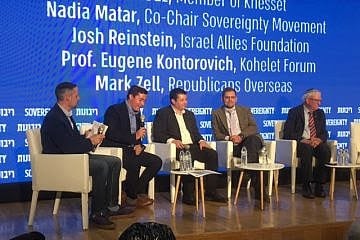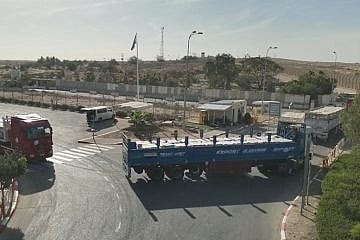The International Court of Justice is expected to issue a temporary ruling in the coming weeks or months.
Shimon Sherman
(JNS)
The genocide case brought by South Africa against Israel in the International Court of Justice has advanced to a new stage. Over Thursday and Friday, the legal teams of both countries unfolded their arguments before the tribunal in preliminary hearings in The Hague.
“The South Africans are accusing Israel of the crime of all crimes,” Avraham Shalev, an adviser and specialist in public law at the Kohelet Policy Forum told JNS. “Proving genocide has occurred requires the highest burden of proof,” he added.
The ICJ is an international legal body that operates under the auspices of the United Nations. It has the right to adjudicate cases between states either with the explicit permission of the defendant state or by prior agreement in the form of an international agreement or by formal notification to the court.
In this case, the basis for the trial is the Convention on the Prevention and Punishment of the Crime of Genocide, which was established in 1948 in response to the crimes of the Holocaust and was signed both by Israel and South Africa. According to the convention, the crime of genocide requires the intentional destruction “in whole or in part, a national, ethnical, racial or religious group.”
Israel is the fifth country to face the charge of genocide in the ICJ.
The South African case
In late December, Pretoria submitted an 84-page charge to the ICJ in which it formally accused Israel of genocide. The South African legal team is headed by Professor John Dugard, who chaired a U.N. Commission of Human Rights inquiry committee and who has called Israel an apartheid state and for an arms embargo on Israel.
On Thursday, the legal team unfolded its argument in which it tried to establish the intentional perpetration of genocide by the Israeli government.
“Israel has transgressed article two of the [Genocide] Convention, committing acts that fall within the definition of genocide,” attorney Adila Hassim claimed on Thursday morning.
The South African delegation also claimed that the very establishment of the State of Israel was tantamount to genocide.
“The violence and the destruction in Palestine and Israel did not begin on October 7, 2023. The Palestinians have experienced systematic oppression and violence for the last 76 years,” South African Justice Minister Ronald Lamola told the court on Thursday.
In an attempt to establish intent, the South African delegation brought a series of quotes from various Israeli personalities spanning from the prime minister and the defense minister to random soldiers fighting in Gaza and even including an Israeli singer.
In one piece of evidence, the South Africans showed Prime Minister Benjamin Netanyahu talking about “wiping out the seed of Amalek.” In another, Israeli soldiers were seen celebrating as they blew up a part of the Shejaia neighborhood in Gaza City.
“The quotes of anyone who isn’t directly involved with the decision-making process of the war are not relevant for establishing intent,” Shalev said.
Regarding statements made by members of the War Cabinet, Shalev explained that “many of these quotes were taken out of context. They tried to say that [Defense Minister Yoav] Gallant’s statement saying, ‘We are fighting human animals’ was genocidal but it is clear he was talking about Hamas fighters.”
The South Africans continued to demonstrate what they called “acts of genocide.” The delegation mostly referenced statistics about the scale of the destruction wrought throughout the Gaza Strip. They claimed that the scale of the destruction of property and the level of civilian lives lost amounted to a purposeful attempt by the Israeli Defense Forces to destroy the Palestinians living in the Strip.
According to Shalev, the South African delegation’s request that the ICJ directly intervene in an ongoing war is almost unprecedented and is based on an earlier genocide-related case in the ICJ between Ukraine and Russia.
In that case, the Ukrainians challenged an earlier Russian accusation of Ukraine committing genocide against ethnic Russians in the Donbas region of Eastern Ukraine. The ICJ found in favor of Ukraine and ordered Russia to desist from further military action against Kyiv that Russia justified based on the alleged genocide.
“The South African case is not related to the Russia-Ukraine case and it’s a far stretch to relate them,” Shalev told JNS.
The Israeli defense
The six-man Israeli delegation headed by British law professor Malcolm Shaw, a world-leading expert on international law, unfolded its argument before the court on Friday. To begin, the defense team argued that the entire conflict in Gaza cannot be discussed outside the context of the Oct. 7 attacks.
Israeli attorney Tal Becker described some of the atrocities committed on Black Saturday “not because these acts, however sadistic and systematic, release Israel of its obligations to uphold the law as it defends its citizens and territory, but because it is impossible to understand the armed conflict in Gaza without appreciating the nature of the threat that Israel is facing and the brutality and lawlessness of the armed force confronting it.”
Becker accused the South African delegation of purposefully misrepresenting the conflict, saying, “The events of that day [Oct. 7] are all but ignored in the applicant’s submissions.” Becker argued that the events of Oct. 7 established a legal basis for Israel to declare war and pursue legitimate enemy targets.
On the issue of intent, the Israel delegation strongly opposed Pretoria’s description of Israeli policy on the targeting of civilians. The delegation said that “Israel’s lawful aims in Gaza have been clearly and repeatedly articulated by its prime minister, its defense minister, and all members of the War Cabinet.” The legal team also referenced the official IDF directive to all soldiers to “distinguish between combatants and civilians.”
Finally, the team argued that Israel’s persistent efforts to protect civilians, by dropping leaflets with orders to evacuate and securing humanitarian corridors in Gaza, as well as by providing humanitarian aid, shows a clear lack of intent to commit genocide. “To produce random quotes which are not in conformity with government policy is misleading at best,” said Shaw.
The Israeli delegation further argued that the alleged “acts of genocide” as described by the South African delegation were legitimate acts of war. In his statement, Becker accused it of ignoring the ongoing military conflict going on in Gaza and exclusively painting the situation as a series of Israeli actions against an unarmed population.
“In the applicant’s telling, it is almost as if there is no intensive armed conflict taking place between two parties at all, no grave threat to Israel and its citizens, only an Israeli assault on Gaza,” he said.
Shaw also argued that the reality of the ongoing conflict in Gaza and Hamas’s consistent use of civilian installations to launch its attacks renders the term genocide simply inapplicable to the situation.
Shaw explained that civilians suffer in all armed conflicts, “especially when a side attacks civilians and is unconcerned” by the welfare of civilians on its side.
“Not every conflict is genocidal. The crime of genocide in international law and under the Genocide Convention is a uniquely malicious manifestation and stands alone among violations of international law as the zenith of evil, the crime of crimes, ultimate in wickedness,” he said.
“The essence of the argument made argued that the ongoing conflict in Gaza is simply unrelated to genocide law but rather to the laws of war,” Shalev explained.
The Israeli team argued that the ICJ interceding in the ongoing war would effectively remove Israel’s right and ability to defend itself.
“Astonishingly, the court has been requested to indicate a provisional measure calling on Israel to suspend its military operations. But this amounts to an attempt to deny Israel its ability to meet its obligations to the defense of its citizens, to the hostages, and to over 110,000 internally displaced Israelis unable to safely return to their homes. The applicant in its submissions to the court makes almost no mention of the ongoing humanitarian suffering of Israeli citizens at the hands of Hamas, and treats the hostages still held in captivity as barely an afterthought,” Becker said.
Throughout the argument, the Israeli team also attacked South Africa for its open closeness with the terrorist group Hamas.
“South Africa has long hosted and celebrated its ties with Hamas figures, including a senior Hamas delegation that incredibly, visited the country for a ‘solidarity gathering’ just weeks after the massacre,” Becker said
What comes next
Several countries have openly supported Israel in the trial. U.S. National Security Council spokesperson John Kirby said on Jan. 3 that the submission by Pretoria was “meritless, counterproductive, completely without any basis whatsoever.”
The government of Germany also supported Israel, saying it was defending itself from “inhuman attacks,” and that Berlin would intercede as a third party if the case went against Israel.
The governments of the United Kingdom, Canada and Australia, as well as others, have also signaled their support for their Jewish state.
Many Muslim countries, however, have signaled their opposition to Israel in the trial. “I believe Israel will be convicted there. We believe in the justice of the International Court of Justice,” Turkish President Recep Tayyip Erdoğan was quoted as saying.
An actual ruling on the case is expected to take years. However, the court is expected to issue a temporary ruling in the coming weeks or months.
“We can expect some sort of decision fairly soon,” Shalev told JNS. “To prove that Israel committed genocide is a tall order but to get some success in the temporary ruling the South Africans only have to prove that there is a case to be made. In that scenario the Israeli team has a tough job,” he added.
The court’s decision is subject to potential bias as it is composed of representatives from many countries, including authoritarian regimes that in the past have been accused of influencing the decisions of their representatives on the court.
In the current case, the court has representatives from Australia, Brazil, China, France, Germany, India, Jamaica, Japan, Lebanon, Morocco, Russia, Slovakia, Somalia, Uganda and the United States, as well as from South Africa and Israel.
“There is no doubt that there is political pressure on some members of the court. One of the judges on the court is from Lebanon, a country where it is illegal to speak to an Israeli. I find it hard to believe that we are going to get an unbiased court ruling on this issue,” Shalev said.
Once a ruling is issued, the decision of the court is binding by international law. However, there is no enforcement mechanism.
“The impact of a ruling against Israel is not direct. The ruling will likely bounce over to the [U.N.] Security Council where America still has a veto, but it will make it a lot more difficult for countries to openly support Israel and as a result, it will make it a lot more difficult to prosecute the war,” Shalev explained.
“Overall, this trial can go in many directions. The court can directly intervene or uphold the Israeli defense. They can also request that more access to humanitarian aid be given. At this stage it is impossible to know,” he said.
Image: The South African delegation presents its case at the International Court of Justice in The Hague, Jan. 11, 2024. Source: X.













